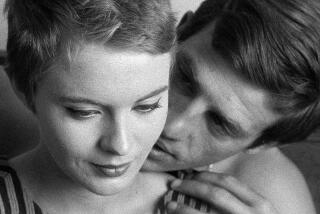To wit: journal entries that cut
- Share via
First translated into English in 1964 and long since out of print, Jules Renard’s endlessly amusing journals are available again, and, whether read straight through or dipped into at random, they’re a marvel to behold. Renard was part of a glittering fin de siecle milieu of Parisian artists (sculptors, painters, actors, writers) that included Rodin, Toulouse-Lautrec, Mallarme, Bernhardt and Verlaine, for starters. (The volume, expertly edited by Louise Bogan and Elizabeth Roget, includes a handy index of proper names.) He achieved renown in France for plays, novels and stories -- most notably “Poil de Carotte” (“Carrot Top” -- Renard had red hair), a collection of brief autobiographical sketches he later turned into a hit at the Comedie-Francaise -- and steadily accrued such distinctions as the Legion of Honor and a place at the Academie Goncourt. But he’s little known today outside of his homeland.
Despite Renard’s successes, the journals give the impression of a fairly level-headed man when it came to applying himself as an artist, one who, although he liked to dwell on praise (he almost never mentions criticism of his work), was not given over to the personal excesses for which his age is so well known. His upbringing was severe: His father, Francois, was the deeply anticlerical mayor of Chitry, a small town about 140 miles southeast of Paris. After Renard’s birth, he refused to speak to his wife again. (“It is thirty years since he has said a word,” his son notes. Desperate for attention, she is a source of annoyance and consternation; the kindest words Renard has for her are: “When the impression she makes on me is least disagreeable, she strikes me as a child.”
The journals are a hodgepodge of brief scenarios, character sketches and apercus -- all containing hints (or, in some cases, double doses) of acidity: “I present my book to a schoolteacher. ‘What do I owe you?’ he asks.” “Maupassant. A man who is never caught short. He teaches nothing, and the nature of his feelings does not earn him our affection. Good morning, good-night. There can be no intimacy with him.” “Every time I want to settle down to work, literature gets between.”
Renard was obsessed with the idea of productivity -- “It should not be thought that laziness is unproductive. Within it, you live intensely, like a hare listening. You swim in it as in water; and are brushed by the grasses of self-reproach” -- and, in one sense, his journal is a fascinating glimpse into the psychological armature that sustained him. His stylistic development isn’t specifically treated: Perhaps he wasn’t able (or didn’t want) to bring such tectonic shifts to the level of consciousness.
Renard’s bedrock consisted of his wife, Marie; their two children; and the beloved Chaumot countryside he visited regularly. He condescended to country folk (“To describe a peasant, one should not use words he does not understand”), but he wrote with unusually earnest passion about nature: “Five o’clock in the evening. Silent, slow struggle between shadow and sun. Shadow gains ground. The trees have it up their waists, their crests still in the light. At the top of the field, the oxen dazzling with whiteness.”
In Edmond and Jules de Goncourts’ “Journal” of the same era, Renard is mentioned once, in passing: “A young fellow, but cold, serious, phlegmatic, not laughing as a young man would at the jokes told in his presence.” Renard despised Edmond (“I had imagined that Goncourt was not a man”), but, judging by his private commentary, there’s some truth to the Goncourts’ observation. Even if Renard was himself unable to laugh in polite company, readers of this work are certainly encouraged to laugh throughout at his singularly savage wit.
--
Tayt Harlin works for New York magazine.
More to Read
Sign up for our Book Club newsletter
Get the latest news, events and more from the Los Angeles Times Book Club, and help us get L.A. reading and talking.
You may occasionally receive promotional content from the Los Angeles Times.







